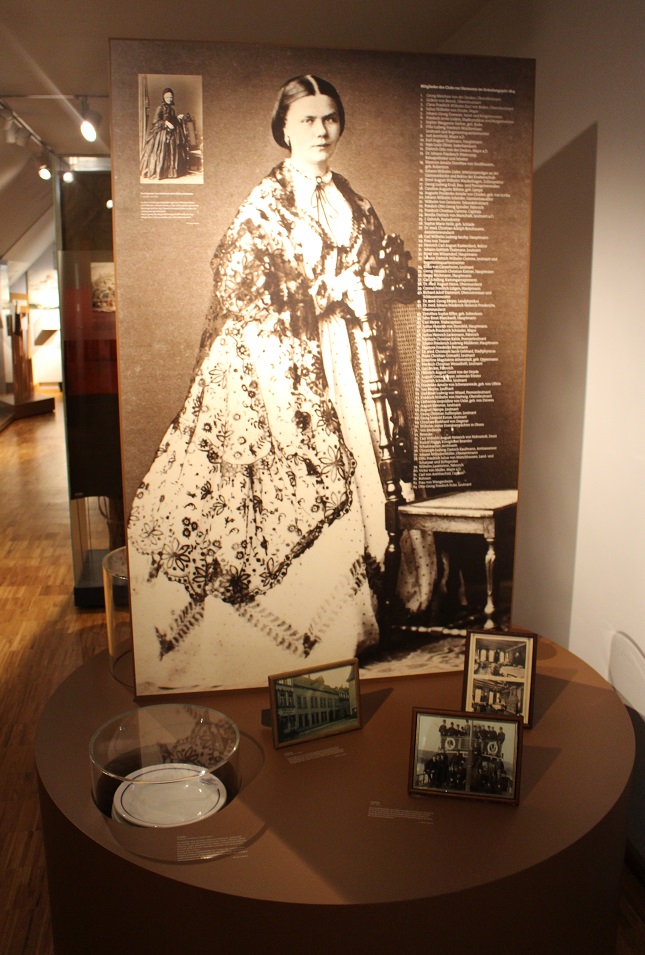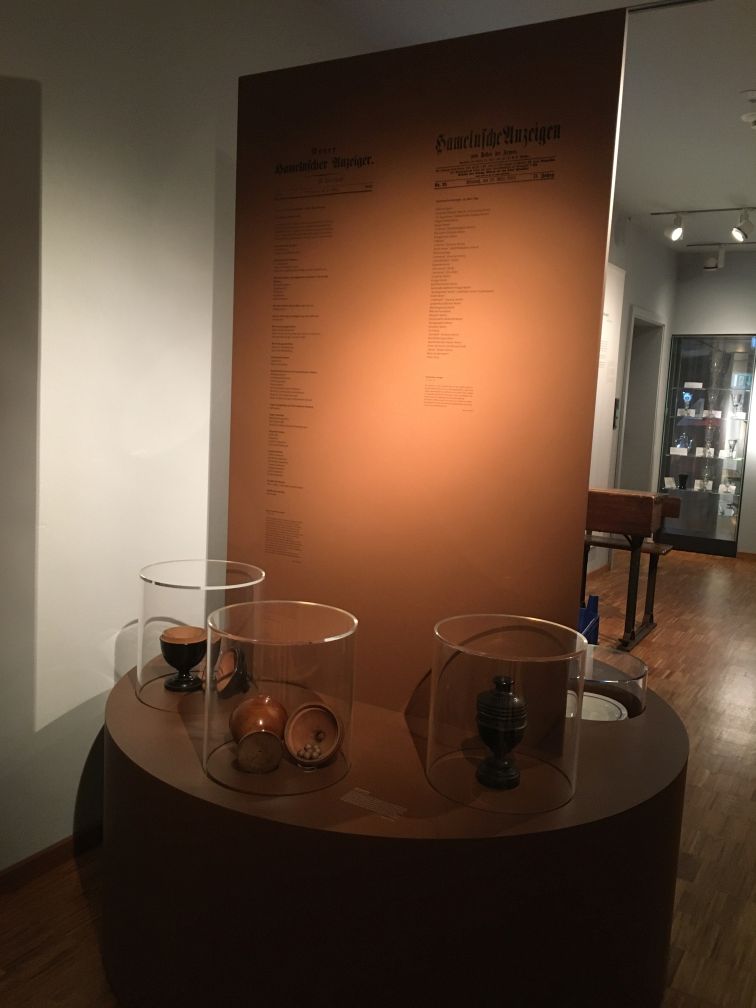
Associations and Clubs, © Museum Hameln
Associations and Clubs
Dinner plates
Hamelin, early 20th century
The “Club zur Harmonie” was founded in October 1819. The dignitaries of the city met here, including officers, teachers, pastors, doctors and chemists. Many nobles were also members. Members mixed freely in the club and without class inhibitions. This was new!
The club was a social meeting place and had no predetermined collective aims. It had its own management for a long period of time and so also had plates decorated with the club emblem.
Running club
N.N., 1907
The running club was a separate group within the Club zur Harmonie. It is not known whether it was a sports club.
Its social life was absolutely the emphasis of the club. The common sharing of free time formed the core of the association.
Clubhouse
Paul Voigt, around 1900
The clubhouse was located in the former so-called commander’s house. The commander of the garrison lived here until the Seven Years War. Then the city bought it. It became the property of the club in 1830. It resided here until the 1930s.
View of the inside of the clubhouse
H. Blesius, 1905
The club became financially independent with the purchase of the building (today Weser Regional Savings Bank). The view of the rooms shows what high standards the members held for an appropriate place to spend their leisure time.
The members Mrs Elderhorst and Miss Lackemann
C. Degèle, around 1880
Among the founding members were officers’ widows, civilian widows and a lady about whom nothing else is known. On Sundays, a so-called ladies’ club was arranged, at which tea and cake were served.
When exactly the opportunity for women to become members of the club was removed is no longer known.

Associations and Clubs, © Museum Hameln
Ballot boxes
Hamelin, before 1934
There was a vote on who could become a member of the “Club zur Harmonie” and “Glee Singing Club”. This occurred by ballot: White balls (yes) and black balls (no) were collected in the containers. Depending on which coloured balls there were more of, the candidates were selected or not. Everyone could save face since the voting procedure was secret. In 1934 the ballot was suspended.
New Hamelin Gazette
14th March 1849
In the troubled years of the Revolution, the number of clubs in Hamelin positively exploded. A club was the ideal organisational form for the representation and promotion of political interests and ideals. Members met without class barriers and held discussions and debates on world views. A first step was to read in a group and acquire new knowledge: There were seven reading clubs alone.
But also recognised was the very practical use of a club, namely in facilitating a non-political goal within a group. This applied to the “Wood Curing Club” just as much as to the “Club for the Gilding of Bosses on the Market Tower.”
Clubs often came and went very quickly, thereby indicating rapid social transformation.
Hamelin City Archive
New Hamelin Gazette, 14th March 1849 (excerpt)
“The clubs in our city …
‘United in harmony,’ if we only observe the clubs in our city and their various, often primarily contrary tendencies: the question occurs to us of whether one can seek the good in contrasts, or whether the multitude of clubs is a satire on that otherwise true phrase? There exist here:
With practical tendencies:
Commercial Association
Agricultural Club
With artistic tendencies:
St George’s Club
Club for Grotto Construction
Club for the Gilding of Bosses on the Market Tower
With the aim of general political and social education:
Craftworkers’ Club
Journeymen’s Club
People’s Association
Civic Association
Research Association
With the aim of holding onto what one has:
Preachers’ Club
With the hope of gaining what one does not have:
Teachers’ Association
With the aim of collecting:
Marquee Tent Club
Club for a fantastic new local venue for public meetings, concerts, balls
With chopping tendencies:
Hude Chopping Club
Wood Chopping Club
Defence clubs:
Hunters’ Club
Soldiers’ Club
Sentient societies with humanistic tendencies:
Temperance Society
Abstinence Society
Hope Association
Missionary Society
Poverty Assistance and Funding Associations
Club for the Poor and Sick: Health Insurance
Club for Poor New Mothers
Club for Small Children: Children’s Home
Against inadequate and old-fashioned clothing:
Sewing Club
Against debt:
Cash Payment Club
The Brotherhood
Simple Burial Coffin Club
Singing clubs:
Hymn Board
Singing Club
Journeymen’s Singing Club
Soldiers’ Hymn Board
Reading clubs:
Grand Reading Club
Medical Reading Club
Craftworkers’ Reading Club
Journeymen’s Reading Club
Preachers’ Reading Club
Teachers’ Reading Club
Children’s Reading Club
Social clubs:
Tea, coffee and other societies
Neutral clubs:
The Clubs”
Hamelin Advertisements
29th March 1893
By the end of the 19th century, the spectrum of clubs in Hamelin had greatly changed. The goals were no longer overwhelmingly political and social, but rather special, personal interests. Sport, socialising and culture were the main emphasis in the formation of associations.
The clubs were very diversified: There were now seven singing clubs, including denominational and only for women or men.
Hamelin Advertisements, 29th March 1893
Workers’ Club
“Augusta Viktoria”, (musical and singing club)
“St. Augustinus”, (Catholic singing club)
General Teachers’ Association
Civic Association
“Charitas”, (charity)
German Shooting Club
Evangelical Club
“Fidelitas”
“Glee”, (singing club)
“Fencing Club”, (charity)
Masonic Lodge
“Germania” (singing club)
“Comfort”, (club)
Commercial Association
“Hannovera”, (club)
“Harmonie”, (Club zur)
Youth Club
Soldiers’ Club
Traders’ Association
Military Comrades’ Club
“Cynological Club”, (pure dog breed enthusiasts)
Credit Association
“Hymn Board”, (singing club)
Agricultural Club
Men’s Singing Club
Men’s Gymnastics Club
Missionary Club
Shoemakers’ Raw Materials Club
Stenographers’ Club
Shooting Club
Gymnastics Club
“Forwards”, (singing club)
Beauty and Health Club
Patriotic Women’s Club
Art and Sciences Club
“Weser”, (rowing club)
Foremens’ Club
Zither Club
